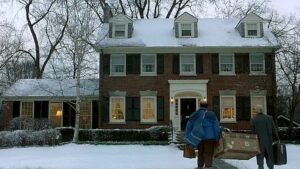
It’s become as much a part of the Thanksgiving season as turkey stuffing and pumpkin pie. Over the past three and a half decades, John Hughes’ Planes, Trains and Automobiles has risen from the low expectations of a run-of-the-mill buddy comedy to a highly anticipated part of many a family’s holiday celebration.
So much so that Paramount Pictures partnered with Fathom Events to issue a 35-year-anniversary theatrical release of the film earlier this month. The studio is also offering a 4K DVD and a Blu-ray disc featuring such bonus content as Dylan Baker’s audition for the part of sinus-stricken Owen, silly deleted scenes featuring stars Steve Martin and John Candy, plus a mini-documentary on the legacy of director John Hughes.
Now’s the perfect time to revisit and review this seasonal comedy classic.
Neal Page (Steve Martin) is not having the Thanksgiving he thought he would endure. He starts off in New York (not the best situation given the chaotic holiday season) and engages in a taxi race with an uncredited Kevin Bacon in an attempt to make a 6pm flight to Chicago. Neal loses the fight but manages to try to pay his way to get a cab. However, someone else takes it and leaves him looking at a puddle with a shower curtain ring in it (excellent foreshadowing). Neal runs after him and manages to get the door open, revealing the identity of the “thief” (the legend that was the late John Candy).
Upon arriving at JFK International Airport, Neal sees that the flight is delayed and finds himself sitting across from the same individual who stole his cab earlier. The man, named Del Griffith, recognizes Neal immediately and engages him in jovial conversation to the former’s chagrin. To complicate matters, our protagonist is bumped from first class to coach and ends up sitting next to Del. They are diverted from Chicago to Wichita due to heavy snow, and all flights are cancelled via a hilarious cameo from Ben Stein. (“Bueller? Bueller?”)
Neal stays with Del after they learn that no hotels are available, and they realize there’s only one room with a single queen-size bed. After a hilarious night (“Those aren’t pillows!”), they realize that someone snuck into their hotel room and robbed them. Del books them on a train to Chicago, but it breaks down in Missouri and they are forced to take a bus to St. Louis.
After one too many encounters, Neal decides that he and Del should part ways. Neal heads to the airport to get a rental car but sees that the space is missing the vehicle. Neal blows a fuse, throws away his agreement in disgust, and heads into the terminal to confront the rental company. Eventually, Del pulls up near him, and they continue on to Chicago, but they go the wrong way down the road and get sandwiched by two massive semis.
The car ends up torched thanks to a lit cigarette, and the two protagonists reconcile their differences at another hotel. The next day, they’re pulled over and the car is impounded, but Neal and Del manage to get back to Chicago in time for Thanksgiving. Upon learning the truth about his new friend, Neal brings him home to meet his family in a moving final scene.
 What I appreciate the most about this unique dynamic is the fact that unlike in most buddy comedies, there is a major verbal argument between the two lead characters in the first act as opposed to the end of the second act. Only John Hughes could have effortlessly pulled it off.
What I appreciate the most about this unique dynamic is the fact that unlike in most buddy comedies, there is a major verbal argument between the two lead characters in the first act as opposed to the end of the second act. Only John Hughes could have effortlessly pulled it off.
There are too many memorable scenes to recount: Neal being faced with the fact that he has to share a hotel room (with one bed) with Del; the devastation in said bathroom, where our protagonist is left with only a facecloth to clean himself after a shower; one station wagon vs. two trucks; Neal’s profane outburst at the rental car agency (the only F-bombs in this R-rated movie); and the heartbreaking revelation that changes our view of Del.
While the movie as a whole is a flawless classic, the meat of this sandwich is the two leads. Steve Martin is beyond perfect as an uptight guy just trying to get home, who’s saddled with someone who doesn’t know when to shut up and by the end has learned to be more understanding and tolerant of others. Meanwhile, John Candy gives what might be his finest performance as the idiosyncratic seller of shower curtain rings and makes a unique transition from irritating comic relief to the unintended heart of this moving flick.
For many years, my family has made it a tradition to see Planes, Trains and Automobiles; besides the ’80s soundtrack, it’s virtually timeless and flawless. If you’ve somehow gone your life without seeing it, right that wrong this Thanksgiving and check it out. You won’t regret it, and that’s a Mr. Drew guarantee.
